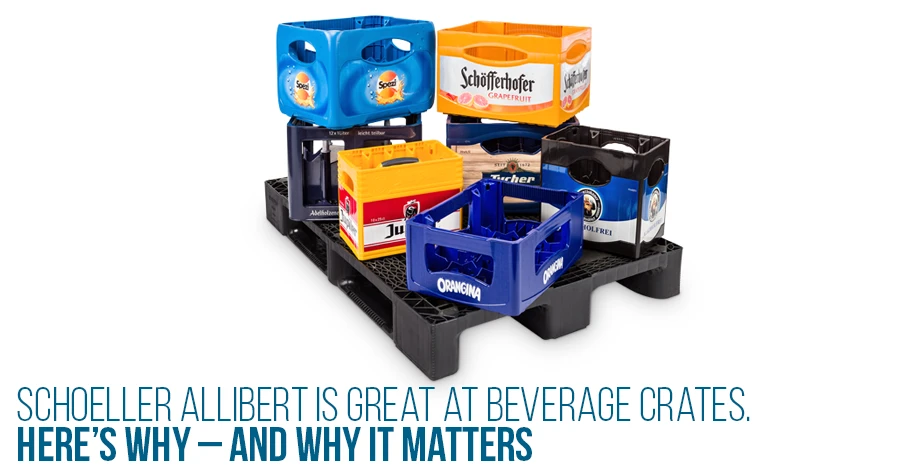Schoeller Allibert is great at beverage crates. Here’s why – and why it matters

Contact us
Get in touchAs summer arrives, bringing with it sun-filled gatherings and enjoyable moments, take a closer look at the crates housing your favorite drinks. Thanks to Schoeller Allibert, these crates are now thoughtfully designed, user-friendly, and exceptionally sustainable. This positive development not only benefits the environment but also has significant benefits for the drinks industry and consumers alike.
Gone are the days of a generic "one size fits all" approach to beverage crates. While their core purpose remains the same—to transport individual units of beer, soda, or water—each brand creates a distinctive offering with its own set of characteristics and requirements.
Consider the following parameters:
Brand Identity: How do beverage crates contribute to your brand's visual identity? Do they effectively communicate your key messages to your target audience? Does the crate design accurately reflect those messages?
Product Visibility: In the highly competitive world of shelf space, does your crate stand out and catch consumers' attention?
Brand Experience: Strong brands are introduced via advertising but built through experience. Do your crates enhance consumers' perception of your brand?
Safety First: Crates must provide double-layered protection: safeguarding their contents from breakage, and ensuring the safety of those who handle them. Factors such as size, weight, and durability come into play here.
Drawing upon decades of experience, the expertise of their engineers, and valuable client feedback, Schoeller Allibert takes all these considerations into account, and more. The result is a sophisticated, multifaceted, and sustainable approach to beverage crate design, production, and recycling that benefits both the brands and the consumers they serve.
How? Let's explore further:
Enhancing beverage crate design for products, brands and consumers.
Today, most beverage crates are made of plastic, and a lot of innovation has gone into their design, for the benefit of products, brands and consumers. Schoeller Allibert in particular has made a big difference in this area.
Resilience plus recyclability: our sustainable approach to beverage crates.
Schoeller Allibert produces a textbook example of how the synergy between economy and ecology brings mutual benefits.
Reducing our carbon footprint by a factor eight.
Not only is our carbon footprint for recycling crates eight times smaller than before, we also offer our customers carbon offset solutions to compensate for the remaining (and as yet unavoidable) emissions.
Here's why our beverage crates are the future.
More and more producers are moving from one-way bottles (e.g. one-way glass bottles in carboard packaging) to returnable bottles in plastic crates. Schoeller Allibert takes pride in playing its part - see the Corona Extra crate, made from recycled maritime industry plastic waste.
Schoeller Allibert leads the way in revolutionizing beverage crate design for a more sustainable future. With our commitment to innovation, resilience, recyclability, and reduced carbon footprint, we are reshaping the industry, while providing an unparalleled experience for both brands and consumers.
Contact us
Get in touchContact us
Inspiration
Related
Est proident veniam laborum exercitation est veniam reprehenderit nostrud officia. Ad Lorem aliquip duis labore duis. Irure deserunt eu minim culpa eiusmod quis ut sint eu pariatur magna aliquip et incidid voluptate cillum Lorem amet ea.
Navigating EU Sustainability Regulations in Transport Packaging—A Roadmap for Compliance and Opportunity
We’re thrilled to introduce our latest whitepaper: New EU sustainability regulations and their impact on packaging. Designed as your essential resource, this whitepaper breaks down the complex, changing landscape of EU s...
Read newsHere's why our beverage crates are the future
Beverage crates may have a long tradition, but don’t think they’re a thing of the past. In fact, they represent the future. As sustainability becomes a top priority, more and more producers are shifting away from single-...
Read newsNew “vintage” beer crates
The new Krombacher “vintage” beer crates combine the style of a traditional wood beer crate with all the protection and marketing benefits of a modern distribution container.
Read news

